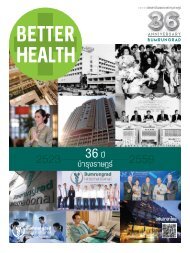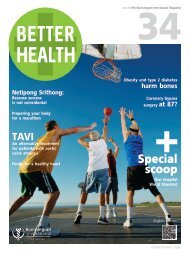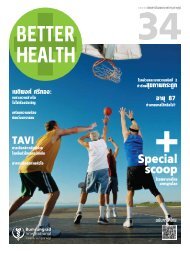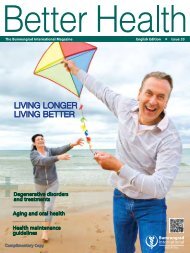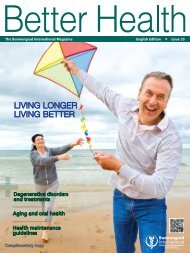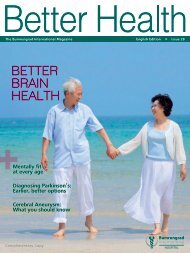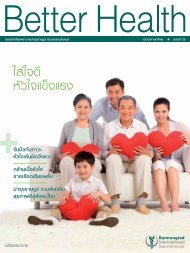Better Health 25 Eng
The magazine for patients and friends of Bumrungrad International Hospital, Thailand.
The magazine for patients and friends of Bumrungrad International Hospital, Thailand.
- TAGS
- bumrungrad
- hospital
- thailand
You also want an ePaper? Increase the reach of your titles
YUMPU automatically turns print PDFs into web optimized ePapers that Google loves.
Dr. Suwatchai Pornratanarangsi Cardiologist<br />
More than ten years’ teaching at one of Thailand’s leading medical institutions<br />
helped establish Dr. Suwatchai as one of the Kingdom’s leading authorities in cardiology.<br />
He also earned certification in interventional cardiology at New Zealand’s<br />
Auckland University.<br />
Q: What made you<br />
decide to become a<br />
cardiologist?<br />
A: Back when I was a<br />
medical student, my grand-<br />
mother suffered an acute<br />
myocardial infarction.<br />
Despite my newly-aquired<br />
medical knowledge, there<br />
was nothing I could do but<br />
stand and watch. That<br />
sealed my decision to become a cardiologist; I didn’t want<br />
to feel that powerlessness again.<br />
Q: What types of cases leave the most lasting <br />
impression? <br />
A: I once met a patient suffering terribly from advanced<br />
cardiovascular disease. Before coming to see me, several<br />
hospitals had told him they could do nothing to help.<br />
My diagnosis confirmed that treating him would be quite<br />
risky, and that he might live longer by skipping treatment. <br />
But the patient couldn’t bear the symptoms and asked<br />
to proceed with the treatment anyway. It was very difficult<br />
indeed, but in the end it was successful. As a smile returned<br />
to the patient’s face, I felt so proud that I was able to help<br />
give him a new lease on life. <br />
Q: What interests you most about interventional <br />
cardiology?<br />
A: I’m very intrigued with how the procedure involving<br />
catheterization to restore narrowed coronary arteries <br />
may also have applications for other blood vessels in <br />
the brain, kidney or legs. Being well-versed in all the <br />
body’s veins and arteries gives me the opportunity to <br />
collaborate with other specialists, and I get a fuller <br />
picture of each patient’s overall health. <br />
<br />
Dr. Yot Navalitloha Neurosurgeon<br />
Dr. Yot graduated from the Faculty of Neurosurgery at Chulalongkorn University<br />
before heading to the US for specialized study in brain and spine medicine. His<br />
advanced training and years of practical experience are put to good use in the<br />
complex field of neurosurgery.<br />
Q: What is the most challenging aspect of being a<br />
neurosurgeon?<br />
A: I’ve found that the most challenging part of neurosurgery<br />
comes when deciding whether or not to proceed with<br />
surgery. In cases where a patient’s tumor is in contact<br />
or very near a critical area of the brain, attempting a<br />
complete removal may risk impairing the patient or, in the<br />
most serious cases, the patient may not make it through.<br />
It’s vital that the neurosurgeon be able to judge whether<br />
surgery will successfully remove the tumor or if other,<br />
safer methods such as radiation therapy or chemotherapy<br />
should be performed instead. <br />
Q: What types of cases leave the most lasting<br />
impressions? <br />
A: One of the most vivid cases involved a woman during<br />
her eighth month of pregnancy. After she fainted, we<br />
discovered she had a large brain tumor that required<br />
immediate surgery.<br />
We couldn’t operate with her lying on her back because<br />
the baby’s weight would prevent proper blood flow. So we<br />
had no choice but to operate with her lying on her side.<br />
The surgery was successful,<br />
and we safely delivered the<br />
baby the following morning.<br />
Originally we thought we<br />
might have to make a choice<br />
between the mother and the<br />
baby surviving, so it was a<br />
great relief that we were<br />
able to save them both. <br />
Q: What principles guide you in your work as a <br />
surgeon?<br />
A: I always strive for perfection in each and every case.<br />
Medical errors can be major setbacks; the risks can <br />
be higher when complex procedures and multiple<br />
professionals are involved. My style might be seen by<br />
some as uncompromising, but there’s no room for <br />
compromise when it comes to the safety of patients.<br />
Neurosurgery requires that I stay completely focused <br />
on what I am doing at the moment I’m doing it; that’s<br />
the only way that the treatment can even come close to<br />
perfection.<br />
13



